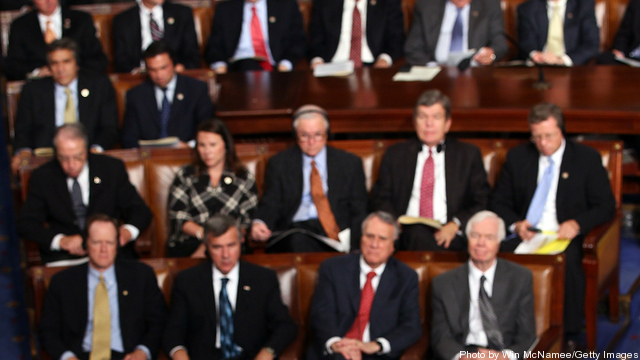
Everyone across the political spectrum talks about the need to wean the US from foreign oil. But when it comes to the details-how to actually make America more energy independent-the political posturing begins.
Recently, a Congressional dust-up dogged the national Renewable Fuel Standard. The year has also seen fights over the Keystone XL pipeline and the Pentagon’s renewable fuels efforts. And despite widespread support from Americans-and strong support from the auto industry itself-some still object to the 54.5 mpg by 2025 standard expected out later this summer.
There is another way. A single policy could usher in cheaper, cleaner, more “made-in-America” fuels, while boosting the economy and saving money for businesses and consumers alike.
After two years of study by some of the top research institutions across the nation, we at the National Low Carbon Fuel Standard Project propose a non-political approach to America’s fuel future. A national Low Carbon Fuel Standard that reduces the carbon intensity of fuels by 10-15 percent by 2030 would take decisions out of the political realm, and set up a level playing field with known rules based on science.
A Low Carbon Fuel Standard (LCFS) establishes a national target that lets energy companies know how clean the fuel they sell must be. But it doesn’t pick winners and losers. It leaves the decisions about meeting the target up to the energy companies themselves.
So an oil company, for example, might diversify into electric or hydrogen fuels. It might offer customers more low-carbon biofuel options. Or it might decide to outsource its efforts and buy credits, either from other oil companies that can lower the carbon intensity of their fuels more efficiently, or from companies that specialize in producing low-carbon fuels.
Our nation’s current Renewable Fuel Standard was put in place by the George W. Bush administration back in 2005 to stimulate specific volumes of biofuels. An LCFS would add to those incentives and promote innovation of a broader portfolio of cost-effective, low carbon fuels. By not requiring any particular fuel to be included, an LCFS will provide flexibility to energy companies to meet the targets using any mix of fuels they want.
The National Low Carbon Fuel Standard Project’s far-flung researchers hail from Oak Ridge National Laboratory in Tennessee, the University of California, the University of Illinois, the University of Maine, Carnegie Mellon University in Pittsburgh, and the International Food Policy Research Institute in Washington, D.C. Each institution focused on a particular aspect of a Low Carbon Fuel Standard-from its potential effects on jobs and the economy, to its likely impacts on farmers and on national energy security.
Our findings: A well designed LCFS will save American consumers $411 billion by 2035 compared to a national energy policy with no renewable fuel policy. It will buffer our economy against global oil price gyrations-including the price spikes that tend to precede recessions-and provide a hedge against high oil-import costs. By substituting domestic resources like biomass, natural gas, and electricity for imported oil, an LCFS provides energy security savings of up to $22 a barrel.
A national LCFS is an economic engine. It creates fresh opportunities for new fuels to compete in the marketplace. It sends market signals that attract investment and spur innovation. And it reduces the pressure to develop dirty, high-carbon unconventional fossil resources, while boosting investments in cleaner, homegrown alternatives.
And finally, our research found a national LCFS encourages farmers to grow biomass crops that are especially suitable for conversion to fuel, and steers them away from selling food crops like corn into the biofuels market. It also gives farmers more options for planting marginal and degraded cropland. This is good both for farmers, and for the food budgets of American families.
As researchers at top institutions, we believe an LCFS will help in the necessary goal of curbing climate change emissions. But we recognize that what is a huge motivating factor for some-curbing greenhouse gas emissions and leaving our planet in better shape for our grandchildren-cannot motivate those who are not persuaded by the global scientific consensus on climate change in the first place.
Given these political realities, perhaps our most important finding is this: A Low Carbon Fuel Standard is a major win for American consumers, businesses, and farmers, with large positive effects on our economy and our national security in the long run. And this is true even if you ignore the climate change angle completely.
At the moment, the United States sends about a billion dollars a day to other countries to buy oil, most of it for transportation. A lot of those countries don’t share our values. And we can’t just drill our way out of dependence here at home because we use so much more oil than our known reserves can supply.
Developing alternative fuels made right here in America makes our nation more energy independent. By encouraging innovation and investment, it boosts our economy and supports job growth. And by diversifying fuel sources and giving Americans more fuel options, it saves money for consumers and businesses alike.
A national Low Carbon Fuel Standard would accomplish all of this, and set our nation on a more secure and prosperous path.
Daniel Sperling, Ph.D. is director of the National LCFS Project and director of the Institute of Transportation Studies at University of California, Davis. Madhu Khanna, Ph.D. is professor of agricultural economics at University of Illinois, Urbana-Champaign. More information is available at http://NationalLCFSProject.ucdavis.edu.
